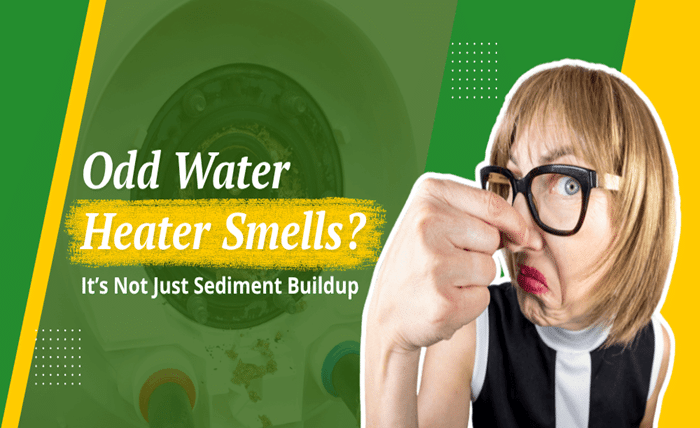
Strange smells from your hot water aren’t just unpleasant, they’re also a warning sign. If your water heater suddenly gives off an odor similar to rotten eggs, sulfur, or musty dampness, it’s easy to blame sediment. And yes, sediment buildup is one common cause, but it’s not the only one.
If your water heater is emitting unusual odors, it might be time to consider other potential issues beyond sediment buildup. Sometimes, these smells can be indicative of a more complex problem that requires professional attention. For instance, if you notice a persistent metallic or burning odor, it could be a sign of electrical issues or overheating components. In such cases, it’s crucial to address these concerns promptly to prevent further damage. Similarly, if you’re experiencing heating issues in other areas of your home, such as inconsistent warmth or strange noises, it might be worth exploring solutions like furnace repair el paso to ensure your entire heating system is functioning efficiently. Taking proactive steps can help maintain a comfortable and safe home environment.
Let’s dig into the real reasons behind those odd smells, and what you can do about them.
It Starts with the Water Source
First, let’s consider what’s going into your water heater. Municipal or well water supplies can carry natural minerals, bacteria, or chemicals that react once heated. That reaction can trigger strange odors, especially when water sits in the tank for long periods.
For example:
- Harmless bacteria often react with the anode rod inside the heater and cause sulfur-smelling water.
- Musty or earthy smells usually come from algae or organic matter in healthy water.
- Metallic smells might indicate corrosion or deteriorating internal parts.
The Anode Rod: A Key Player in the Smell Game
You’re not alone if you’ve never heard of an anode rod. This metal rod plays a significant role in protecting your water heater and, unfortunately, sometimes creates foul odors.
Here’s how it works:
- Its anode rod is made of aluminum or magnesium, which attracts corrosive minerals but sacrifices itself to protect the tank.
- When it reacts with sulfur or certain bacteria in the water, it produces hydrogen sulfide gas, known for its rotten egg smell.
So, if your water heater smells bad and your water comes from a well or mineral-heavy supply, the anode rod could be to blame. It may be doing its job too well.
Swapping a magnesium rod for an aluminum-zinc rod can often solve the issue. But again, it’s not always the only culprit.
Yes, Sediment Matters, But It’s Just One Part
Let’s not downplay sediment entirely. Over time, minerals like magnesium and calcium settle at the bottom of your water heater tank. This layer of sludge reduces efficiency and creates a cozy environment for bacteria.
Here’s what happens:
- Sediment traps heat and moisture, which bacteria love.
- Bacterial growth creates unpleasant odors, especially if the tank isn’t flushed regularly.
- If left unchecked, it can even clog heating elements or cause overheating.
Don’t Forget the Dip Tube
Another hidden component inside your water heater is the dip tube, a plastic tube that directs cold water to the bottom of the tank so it heats evenly. But over time, these tubes can break down and shed plastic flakes, which may cause:
- Cloudy water.
- A plastic or chemical smell.
- Poor water heating performance.
Though less common than sediment or anode rod reactions, a deteriorating dip tube still adds to the problem. Replacing it is simple for a professional and often improves overall water quality.
Bacterial Growth Inside the Tank
One of the biggest hidden culprits? Bacteria grow directly inside your water heater. It’s especially common if:
- You set the thermostat below 120°F, which creates ideal conditions for bacteria.
- Infrequent use of the tank lets water sit stagnant..
- The water source contains organic matter or microbes.
Low temperatures can save energy, but also create perfect conditions for microbial growth. Raising the thermostat to 140°F for a few hours can sometimes act as a “thermal shock,” killing off some bacteria. However, this should be done carefully to avoid scalding and should never replace proper cleaning.
You should drain and disinfect the water heater if you suspect bacterial growth.
Simple Fixes You Can Try First
Before calling a plumber, here are a few safe steps you can take:
- Flush the tank. Flush and drain your water heater to remove debris and sediment.
- Check the thermostat setting. Make sure it’s between 120°F and 140°F to prevent bacteria buildup.
- Run the hot water for several minutes. This can flush stagnant water out of the lines.
- Add hydrogen peroxide. In some cases, running a diluted peroxide solution through the tank can temporarily eliminate odors.
If none of these help, or the smell returns quickly, it’s time to bring in a professional for inspection and possible replacement of internal components.
Be Vigilant with the Smell!
Strange smells coming from your water heater aren’t just caused by sediment. They can come from bacteria, a failing anode rod, corroded components, or stagnant water. Ignoring the odor might lead to bigger problems later, from water quality issues to tank failure.
Routine maintenance like flushing the tank, checking internal parts, and testing water temperature goes a long way in preventing odors. And if that smell persists? It’s worth having your water heater in Brighton, AL inspected before the problem worsens.




